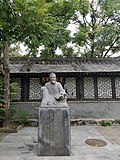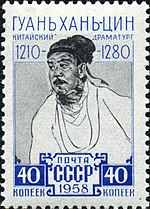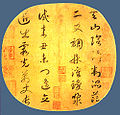Sanqu (Chinese: 散曲; pinyin: Sǎnqǔ; Wade–Giles: San-ch’ü) is a fixed-rhythm form of Classical Chinese poetry or "literary song". Specifically sanqu is a...
4 KB (551 words) - 15:41, 28 April 2024
the sanqu (散曲) lyric type of Classical Chinese poetry forms. The poem "Autumn Thoughts" (秋思) is the most widely known of his sanqu poems. His sanqu poems...
4 KB (442 words) - 09:23, 3 May 2023
Qu (poetry) (section Sanqu)
the Zaju (雜劇), in which case these Qu may be referred to as sanqu (散曲). The San in Sanqu refers to the detached status of the Qu lyrics of this verse...
3 KB (366 words) - 01:24, 29 March 2024
Yuan poetry (section Sanqu)
fixed-tone verse forms are particularly associated with Yuan poetry. Ci, qu, and sanqu were all popular during the Yuan poetry period. They were a fixed-tone and...
15 KB (2,142 words) - 13:58, 19 June 2024
this language, including verse, drama and story forms, such as the qu and sanqu. The phonology of Old Mandarin has been inferred from the ʼPhags-pa script...
30 KB (2,501 words) - 19:47, 4 September 2024
Zhongyuan Yinyun was a dictionary that codified the rhyming conventions of new sanqu verse form in this language. Together with the slightly later Menggu Ziyun...
84 KB (8,874 words) - 14:25, 19 November 2024
this language, including verse, drama and story forms, such as the qu and sanqu poetry. The rhyming conventions of the new verse were codified in a rime...
85 KB (8,801 words) - 08:53, 22 November 2024
the Zaju (雜劇/杂剧), in which case these Qu may be referred to as sanqu (散曲). The San in Sanqu refers to the detached status of the Qu lyrics of this verse...
117 KB (13,384 words) - 05:17, 19 November 2024
folks. There were prolific works in zaju variety shows and literary songs (sanqu), which were written in a distinctive poetry style known as qu. Novels of...
143 KB (16,014 words) - 08:47, 9 November 2024
the Divine. Notable authors include Kabir, Surdas, and Tulsidas. Chinese Sanqu poetry was a Chinese poetic genre popular from the 12th-century Jin Dynasty...
24 KB (2,843 words) - 04:30, 16 November 2024
addition to playwriting, Guan Hanqing is also said to be a master of songs (sanqu 散曲). 57 of his songs (xiaoling 小令) and 14 song suites (taoshu 套數) survive...
7 KB (992 words) - 08:34, 5 February 2024
Southeast Asian regions. Nanyin Opera consists of three parts: zhitao, dapu and sanqu. It can be performed in two forms: tanchang (singing while playing a musical...
141 KB (15,317 words) - 15:25, 21 November 2024
Rong'an – Ānzì 安治 – Subgroup N Longsheng – Rìxīn 日新 – Subgroup N Hechi – Sānqū 三區 – Subgroup N Nandan – Méma 麼麻 – Subgroup N Donglan – Chéngxiāng 城廂 –...
25 KB (2,393 words) - 16:01, 26 October 2024
dynasty's zaju (雜劇) theater, its associated orchestration, and the qu (曲) and sanqu (散曲) forms of Classical Chinese poetry. One documented way in which this...
147 KB (19,939 words) - 01:52, 6 November 2024
rhythms of the ci came to be reflected in the set-rhythm pieces of Chinese Sanqu poetry (散曲), a freer form based on new popular songs and dramatic arias...
27 KB (3,175 words) - 06:53, 20 October 2024
poems independent of a drama. This kind of independent qu is called sanqu. Sanqu is classified into xiaoling, a single song, and taoshu, a song suite...
35 KB (4,747 words) - 02:50, 15 June 2024
Haowen (died 1257), Chinese Sanqu poetry writer 1191: Janna (died unknown), Kannada poet 1193: Shang Dao (died 1258), Chinese Sanqu poet 1196: Alberico da...
3 KB (336 words) - 20:11, 27 June 2024
most highly rated form of opera during the Yuan dynasty, and of sanqu 散曲, pinyin: sănqŭ (a variety of Chinese fixed-tone song-lyric, with many different...
3 KB (374 words) - 23:32, 28 March 2024
(Chinese: 酸齋; pinyin: Suānzhāi) was an Uyghur scholar, songwriter and a famous sanqu and shi author lived in Mongol Empire. He was born in 1286, Yongzhou to...
8 KB (1,011 words) - 20:52, 12 June 2024
Yuan dynasty's (1279–1368) distinctive qu opera culture and spawned the sanqu form of individual poems based on it. Classical Chinese poetry composition...
77 KB (10,039 words) - 08:54, 25 October 2024
Wang Heqing 王和卿 (c. 1260), a writer of Chinese Sanqu poetry, was a native of Daming in Hebei province. Other than his birthplace, which is noted in Zheng...
1 KB (187 words) - 23:32, 28 March 2024
(Chinese: 张公坟; pinyin: Zhāng Gōng Fén) is a monument to the Yuan-Dynasty Sanqu poet Zhang Yanghao. It is located in a public park in Liu Yun Village (柳云村)...
2 KB (244 words) - 09:32, 22 January 2024
Wang Yun (Chinese: 王惲, 1228–1304), was a writer of Chinese sanqu poetry from Weizhou (卫州, in modern Henan province). He was born during the Jin dynasty...
3 KB (340 words) - 20:58, 23 November 2023
芳城园三区 Fangchengyuan Sanqu 110106013007 芳群园一区 Fangqunyuan Yiqu 110106013008 芳群园二区 Fangqunyuan Erqu 110106013009 芳群园三区 Fangqunyuan Sanqu 110106013010 芳群园四区...
5 KB (368 words) - 12:53, 13 June 2024
“The Old Man of Zuo Mountain” 左 山老人. was a Yuan 元 period writer of Chinese Sanqu poetry. He was also a noted calligrapher and landscape artist. Unfortunately...
3 KB (395 words) - 11:04, 7 May 2023
old traditions. New genres of vernacular literature such as the qu and sanqu poetry appeared, as well as the Zhongyuan Yinyun, created by Zhōu Déqīng...
67 KB (5,001 words) - 17:38, 2 November 2024
particular wording of the lyrics. Tone (linguistics) Four tones of Middle Chinese Chinese Sanqu poetry Ci (poetry) Qu (poetry) Regulated verse v t e...
2 KB (283 words) - 18:48, 16 September 2024
writer of Chinese Sanqu poetry and official, was the nephew of the noted official Yao Shu 姚樞 (1203–1280) and uncle of the dramatist and sanqu poet Yao Shouzhong...
3 KB (407 words) - 11:04, 7 May 2023
authored prose, poems, as well as songs. He is particularly well known for his Sanqu poetry. Among his works is one of the most frequently anthologized poems...
4 KB (291 words) - 00:50, 16 December 2022
with Notes, and Two Essays, the first critical edition of the complete sanqu songs of Kang Hai (1475–1541), was awarded second prize in both the 2011...
13 KB (1,642 words) - 22:10, 1 September 2023














